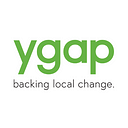By Adelide Mutinda, First Gens Program Manager, ygap.
“After more than 10 years of running over 40 in-person programs supporting more than 500 ventures, like many other programs, we had to rethink everything we knew about what, why and how we deliver our accelerator program. The process pushed us out of our comfort zone as we had to go back to the drawing board and redesign what became our first ever virtual accelerator program. With only half the time we usually have for the 5-day intensive that serves as the start of our accelerator program, we had to strip back the content to the essentials without compromising on our value proposition. Here are some things we learned along the way.
Change is an uncomfortable but necessary process
Changing habits - what we know, what feels familiar - is not easy. It is actually quite uncomfortable, and even scary at times. We had to lean into that feeling of discomfort and embrace it. Allow yourself to enjoy the not knowing. Be curious. Discomfort is a necessary process of growth and, looking back, we know that we have grown as a result of the process of letting go of how we thought things needed to be done.
Have clear objectives
Set clear objectives about what you want to achieve and let them guide you. Let your objectives be your North Star. Get input from the team around those objectives. Make sure the objectives are clear to everyone on the team; iterate the when and the how, but have a clear what!
The plan is constantly evolving
It’s one thing to envision how things will play out and then there is what actually happens. Sometimes the best laid plans fall short. The internet doesn’t work. Someone’s audio gets messed up. That’s ok. Keep an eye on what is happening throughout the sessions and adjust accordingly. Sometimes we noticed that the format wasn’t working as well as we had thought and we had to innovate on the fly. Be flexible!
Create a safe, fun space
Have fun icebreakers. Play some upbeat music. Tell jokes. Just have a good time. Virtual does not have to mean boring!
Let tech be your friend
Leverage different tech tools — we used breakout rooms on Zoom, we incorporated Jamboards and encouraged use of the chat feature. Importantly, make sure everyone understands and feels comfortable using these tools. We took time early on in the program to make sure everyone was testing and using all the different tech tools we used during the week.
Ask for feedback
Create a space and system for people to give feedback about what works and what doesn’t. You’re all learning together.
Give feedback
Create a space where people feel comfortable receiving feedback from each other. We encouraged people to speak up as much as possible but also created opportunities for peer to peer feedback using tools like Jamboards.
Authorship still matters
Virtual is not an excuse for running a one-sided, top-down program. Let participants have some authorship in the program. On day one, we asked people to tell us what they want more of and what they want less of and we asked them to hold all of us accountable. On day three, we checked in to see how we were doing and incorporated that feedback.
Be intentional about everything
You have to be very intentional about the kind of program you want to offer. It is very hard for casual collisions and serendipitous meetings to occur organically in virtual spaces. You have to curate and create these opportunities. This means being intentional about using things like breakout rooms, breaks, check-ins and check-outs and encouraging people to speak up as often as possible outside of the program. We use Whatsapp and share information about life updates. We have had funny gifs and dance videos shared on these platforms and this has helped to deepen the relationships among the cohort.
Take care of your mental health and wellbeing
Redesigning a program calls for a lot of strategic planning and thinking, and heaps of doing. It is a draining, sometimes exhausting process. Take care of yourself. Be kind to yourself. Practice self-care!”
Learn more about ygap First Gens at www.ygap.org/firstgens
